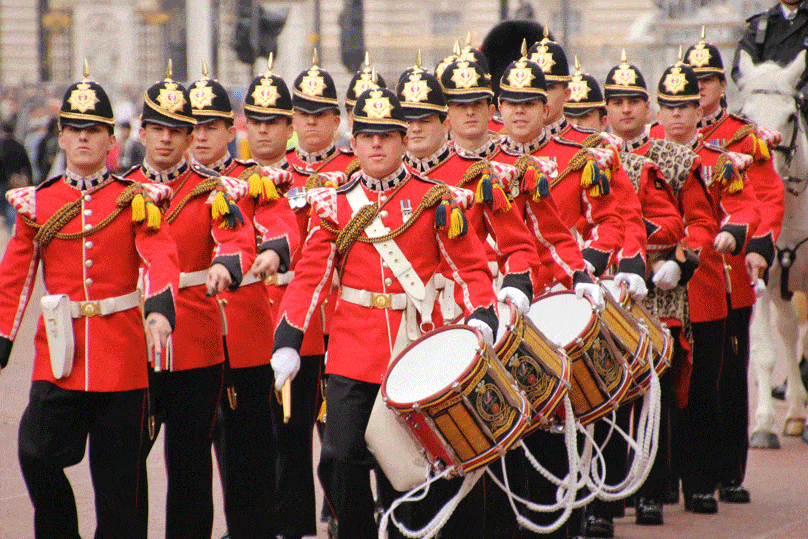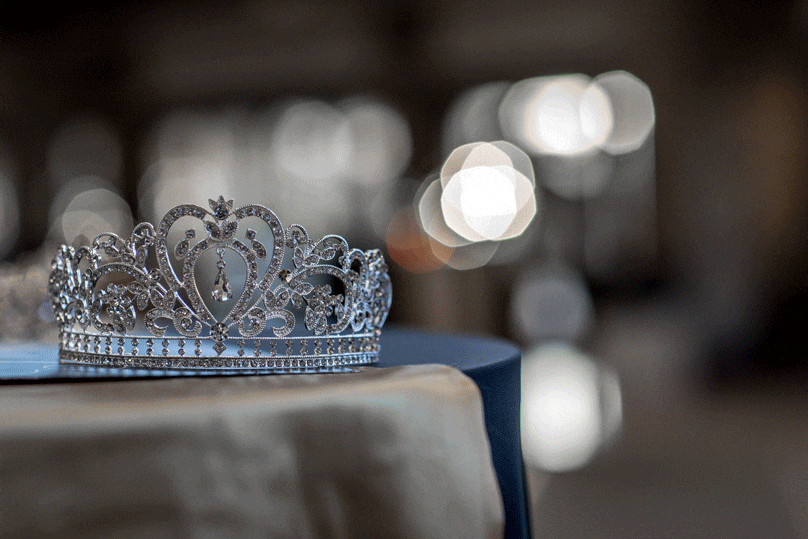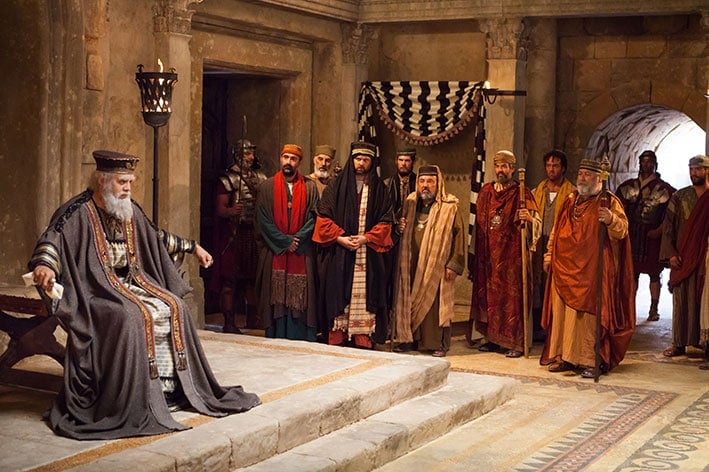
Americans are supposed to not care about Royal Weddings because, you know, American. We actually have it in our Constitution that you cannot have titles of royalty and nobility. If you come here and become a citizen you have to legally drop “Sir” from Sir Anthony Hopkins or Sir Patrick Stewart.
So it’s pretty bred in the bone to have something ranging from indifference to hostility to the whole Royals thing—at least officially and in public.
But truth to tell, Americans have a soft spot for English royalty anyway (Saudi royalty not so much). So bazillions of us watched the Royal Wedding and oohed and ahhed over the beautiful spectacle. Sometimes, to preserve the fiction of democratic equality, we spoke of it sort of like the drooling Soviet Party official sent to accompany Robin Williams’ character to Macy’s in Moscow on the Hudson: “Look! More decadence!”
And that brings up something curious for me; something that, as an American, I’m not supposed to think. It is this: something in human nature requires royalty and when we get rid of the political expression of that need we don’t get rid of royalty, we just find new ways to create it.
As C.S. Lewis, unhampered by American political commitments, said:
“Monarchy can easily be debunked, but watch the faces, mark well the debunkers. These are the men whose taproot in Eden has been cut: whom no rumour of the polyphony, the dance, can reach – men to whom pebbles laid in a row are more beautiful than an arch. Yet even if they desire mere equality they cannot reach it. Where men are forbidden to honour a king they honour millionaires, athletes or film stars instead: even famous prostitutes or gangsters. For spiritual nature, like bodily nature, will be served; deny it food and it will gobble poison. “

That is not to say I think we Americans need political royalty again. I don’t. And, indeed, I think few people are more guaranteed to be kooks than Americans who seriously believe that we are right on the verge of turning the US into a Catholic monarchy like pre-Revolutionary France.
It is to say that we have lots of royalty running around the US and we kid ourselves to pretend we don’t.
Kennedys. Reagans. Oprah. George and Amal. Kim and Kanye. Royals all. Ironically, even Lorde is a royal now for a lot of people. We Americans claim we have no interest in nobility, but we run around begging “Just give us a rapper to show us what’s cool. Give us a movie star to show us what’s hot. Give us a pop star to tell us what to sing. Give us a model to show us what to wear. Give us a pundit to tell us what we think!”
When I remarked on this on Facebook, a reader of mine replied, “I think you’re right, with a stupendous caveat. That is, we get to choose our ‘kings.’ I think that the key exercise of human freedom is right there: I choose the influences that govern my life. Truly, not just poetry: my wife is my queen: I have chosen her as the most important influence in my life. I choose to follow Moses and Jesus. I choose Gandhi, King, Wojtyla, Corazon Aquino, my daughter, my brothers, my great-grandfathers. I have chosen the royalty in my life. There are other powers and principalities active in my life whom I didn’t choose, but I resist their rule.”

I largely agree with him, but with one stupendous caveat: human social groups have always chosen their royalty—at least initially. That’s the point. One great, fat, well-swilled lie we Americans are fond of is the notion that royalty is something imposed on us by Royals. In the Way Back When, the story goes, we were all natural Jeffersonian Democrats, living in perfect harmony and equality until one day evil aristocrats moved in, took over, and made us kowtow to them.
Rubbish. We create royalty because we need royalty. Royalty was not invented by royals and imposed on the rest of us. Leave human communities to themselves and they will anoint royals over themselves every single time. It is human nature. And because this desire for royalty really appears to be natural to us (albeit distorted by the Fall like all our other desires) I think it worth looking at.
The scriptural treatment of kingship is fascinating. The author of 1 Samuel stands at the fountainhead of a literary tradition unique in the ancient Near East. He tells us Israel demanded a king and God tells Samuel to warn them that they are rejecting Him and asking to be made slaves. Here’s the account, worth reading in full since it is as contemporary as a Trump MAGA rally:
When Samuel became old, he made his sons judges over Israel. The name of his firstborn son was Joel, and the name of his second, Abijah; they were judges in Beer-sheba. Yet his sons did not walk in his ways, but turned aside after gain; they took bribes and perverted justice.

Then all the elders of Israel gathered together and came to Samuel at Ramah, and said to him, “Behold, you are old and your sons do not walk in your ways; now appoint for us a king to govern us like all the nations.” But the thing displeased Samuel when they said, “Give us a king to govern us.”
And Samuel prayed to the LORD. And the LORD said to Samuel, “Listen to the voice of the people in all that they say to you; for they have not rejected you, but they have rejected me from being king over them. According to all the deeds which they have done to me, from the day I brought them up out of Egypt even to this day, forsaking me and serving other gods, so they are also doing to you. Now then, listen to their voice; only, you shall solemnly warn them, and show them the ways of the king who shall reign over them.”
So Samuel told all the words of the LORD to the people who were asking a king from him. He said, “These will be the ways of the king who will reign over you: he will take your sons and appoint them to his chariots and to be his horsemen, and to run before his chariots; and he will appoint for himself commanders of thousands and commanders of fifties, and some to plow his ground and to reap his harvest, and to make his implements of war and the equipment of his chariots.
“He will take your daughters to be perfumers and cooks and bakers. He will take the best of your fields and vineyards and olive orchards and give them to his servants. He will take the tenth of your grain and of your vineyards and give it to his officers and to his servants. He will take your menservants and maidservants, and the best of your cattle and your donkeys, and put them to his work. He will take the tenth of your flocks, and you shall be his slaves. And in that day you will cry out because of your king, whom you have chosen for yourselves; but the LORD will not answer you in that day.”
But the people refused to listen to the voice of Samuel; and they said, “No! but we will have a king over us, that we also may be like all the nations, and that our king may govern us and go out before us and fight our battles.” And when Samuel had heard all the words of the people, he repeated them in the ears of the LORD. And the LORD said to Samuel, “Listen to their voice, and make them a king.” Samuel then said to the men of Israel, “Go every man to his city.” (1 Sa 8:1–22).
Instead of fawning praise for royalty, the Jewish tradition is deeply skeptical of the king and will, in the prophets, absolutely excoriate him at times.
Yet God does not treat the desire for royalty as though it is purely an expression of the Fall. He treats it like a natural desire. So he works with Israel’s free choice and from it raises up David, who is perhaps the most human figure in the Old Testament. More than that, from David’s kingship God promises a Messiah who will reign over a kingdom that never ends: Christ Jesus. To be sure, both Chronicles and Kings will give us an overall picture of the kings of Israel and Judah that is not a happy one.
But it never simply rejects the human demand for royals as simple idolatry. Rather, kingship is purified, not abolished, in revelation and, in the end, God gives us the perfect King in Jesus. This means that Christians are, in fact, committed to the idea of kingship, though not to the idea of political kingship, since, as Jesus carefully notes, “My kingdom is not of this world” (John 18:36).
So yes, idolatry is tangled up with our longing for royals and sometimes it reaches a horrifying dimension in the “psychopathic god” as Auden described the Royal that Germans created in 1933. But for all that, the data of both experience and revelation reports that the need for royalty is as deep and as natural as the need for a mother and father in human society. All the abusive parents in the world do not prove parents to simply be idols. Nor do all the defective royals and their adulators. Abusus non tollit usum.
Our drive to create royals is so intense that it expresses itself in a million ways. I have often said that somewhere in the world is the World’s Greatest Stamp Collector. And at appointed times and seasons, he walks into a room and, in that little bubble, he is the King. Women feel themselves faint and hot. Strong men feel their manhood rebuked under his greatness. All tremble before his majesty. Then he goes back to his life as an insurance adjuster and nobody knows who he is, while his admirers go home and (if he is a decent man) feel themselves uplifted and ennobled by their contact with this small sacrament of the Great King they truly seek (whether they realise it or not): Christ Jesus.
For that is what our hunger for royals is ultimately all about, I think. We keep searching for Jesus and we will not be denied him. But because we keep settling for idols and anointing them as the Real King instead of realizing that the best person in the world is, at best, merely a sacramental pointing us to the Real King, we keep having our hearts betrayed and broken and some of us simply give up the search and focus only on avoiding the idol while despairing of ever finding the King.
An atheist friend (who I think loves God without realizing it, judging from her instinctive obedience to Jesus in her passionate love for the least of these) remarked on that perceptively when she said, “I wonder if my atheism is relevant to my disagreeing with a desire for a king.”
I told her I am inclined to agree. Atheism is often rooted in the same thing as the Judeo-Christian fear and hatred of idols.
I added, “I think there is also (as I have suggested to you before) a link between your obvious love of people and a sort of subliminal and unrecognized love of God. Many an atheist convert to Christ reports a sort of “Oh! It was You all along!” moment when the connection is suddenly made between their lifelong loves and the Love who is God.”
Not for nothing does Jesus speak of himself as the unrecognized “King” in the Parable of the Sheep and the Goats. And not for nothing does he speak of his kingdom being consummated as a Royal Wedding between himself as the Cosmic Bridegroom and his Bride the Church.
